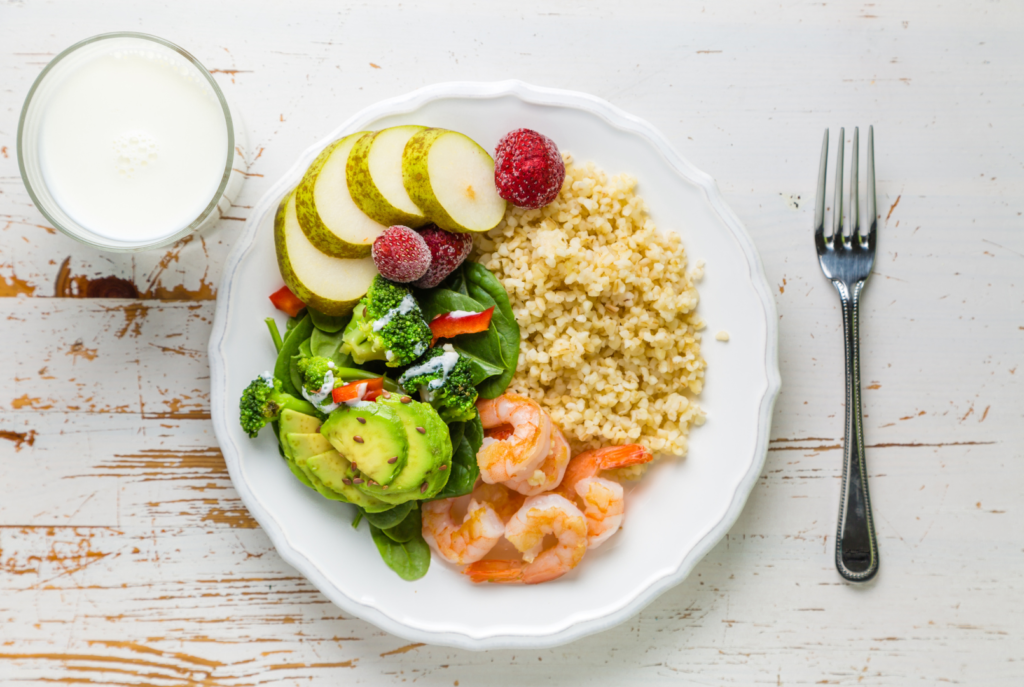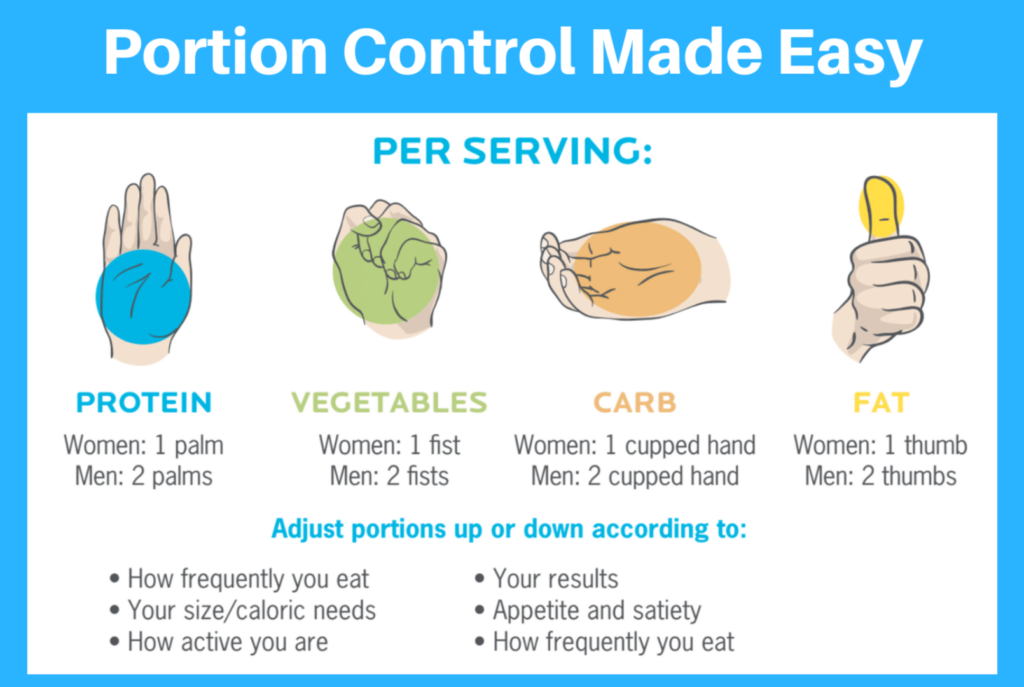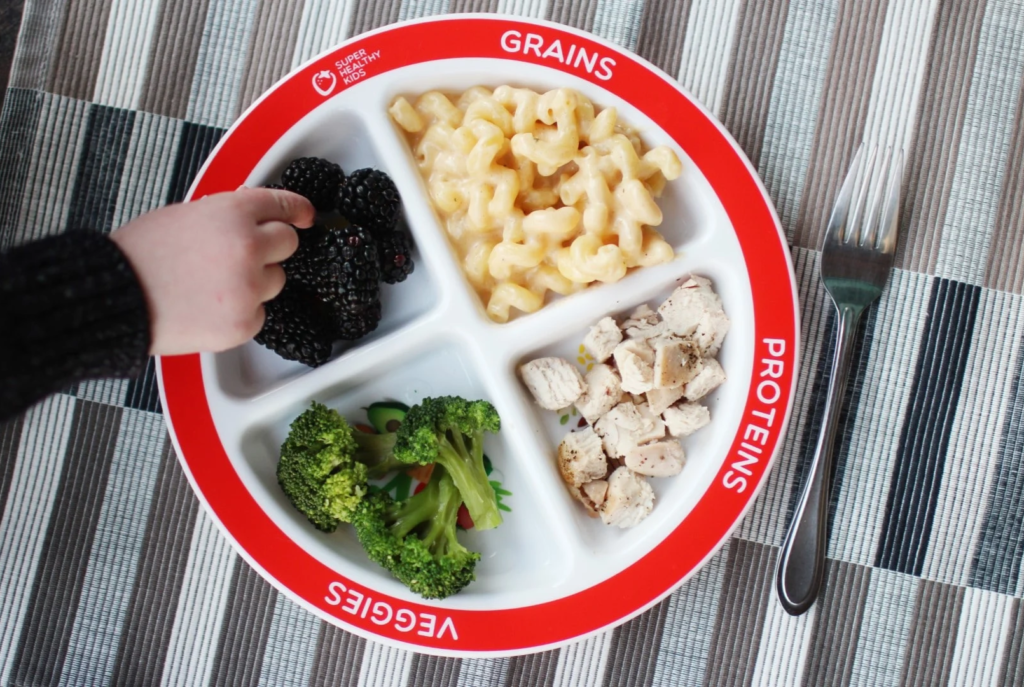

Table of Contents

Portion control is a critical aspect of maintaining a healthy lifestyle. By managing the amount of food you eat at each meal, you can not only improve digestion but also promote weight loss, manage blood sugar levels, and reduce the likelihood of binge eating. With rising obesity rates and lifestyle diseases becoming more common, understanding portion control can significantly impact your health and well-being.
What is portion control?

Portion control refers to the practice of managing how much food you consume during a meal or snack. Instead of eating until you feel full or based solely on hunger, food portioning encourages you to be mindful of the quantity of food, ensuring you’re consuming the right amount for your body’s needs.
Achieving portion control is easier than you might think:
- Measuring serving sizes: Use measuring cups or food scales to gauge portions.
- Using smaller plates: Studies have shown that people tend to eat less when they use smaller dishes.
- Avoid eating from the package: pre-portion snacks instead of eating directly from the bag.
- Being mindful of hunger cues: Eat when you’re truly hungry and stop once you’re satisfied.
Why Is Portion Control Important?
It is important for several reasons, from aiding in weight loss to improving digestion.
Let’s explore the key reasons why serving size management matters.

1. Better Digestion
Overeating can cause indigestion, bloating, and stomach cramps. When you consume large portions, your digestive system becomes overloaded, making it difficult to break down the food efficiently. By controlling your portions, you give your digestive system time to process food effectively, reducing discomfort and promoting better nutrient absorption.
2. Improved Nutrition
When you practice portion sizing, you’re more likely to plan your meals carefully. Instead of piling on empty calories, you become more selective, focusing on nutrient-dense foods like vegetables, lean proteins, and whole grains. This balanced approach helps you consume the essential nutrients your body needs, improving overall health.
3. Balanced Blood Sugar Levels
Eating large portions, especially of carbohydrate-heavy foods, can lead to blood sugar spikes, putting extra strain on your body. Over time, this can lead to insulin resistance and weight gain, increasing the risk of type 2 diabetes. By eating smaller, controlled portions, you can help maintain stable blood sugar levels, preventing energy crashes and cravings.
4. Weight Management
One of the most well-known benefits of portion sizing is its role in weight management. By reducing the size of your meals, you automatically decrease calorie intake, making it easier to achieve or maintain a healthy weight. Importantly, portion control doesn’t require eliminating your favorite foods—it simply encourages moderation.
For instance, instead of eating an entire pizza, enjoy one or two slices paired with a salad. This way, you can still indulge while managing your calorie intake.

5. Increased Satiety
Surprisingly, controlling portion sizes can actually make you feel fuller. When you focus on nutrient-dense foods, particularly those high in protein and healthy fats, your body feels more satisfied. This reduces the temptation to snack between meals or overeat, which is often driven by emotional or mindless eating rather than hunger.
6. Reduced Risk of Binge Eating
Portion management plays a crucial role in preventing binge eating. When you become more aware of how much you’re eating, you’re better equipped to recognize emotional triggers that lead to overeating. Additionally, portioning meals in advance helps prevent the overeating that often occurs when faced with large quantities of food.
7. Reduced Food Waste
By practicing portion awareness, you’re also contributing to less food waste. Preparing meals based on appropriate portion sizes helps avoid excessive leftovers, which often go uneaten and end up being thrown away. This not only benefits the environment but also supports sustainable living.
8. Financial Savings
Eating smaller portions can result in significant cost savings over time. By reducing food waste and buying only what you need, you can save money on groceries. Portion control encourages mindful meal planning, ensuring that you’re not purchasing more food than necessary, which helps keep your budget in check.
How to Practice Portion Control
Incorporating food portioning into your daily routine is easier than you might think.

Here are some easy strategies to help you begin:
a. Measure Your Portions
Start by measuring your food with tools like measuring cups, food scales, or Food portioning containers. Once you become familiar with the right portion sizes, it will be easier to eyeball them.
b. Eat Slowly and Mindfully
Slowing down and savoring your food can help you become more aware of when you’re truly full. Eating slowly gives your body time to signal satiety, reducing the chance of overeating.
c. Use Smaller Plates and Bowls
Research shows that using smaller dishes can help trick your brain into feeling satisfied with smaller portions. The visual illusion makes you feel like you’re eating more than you are.
d. Pre-Portion Your Meals
Avoid eating directly from packages, especially with snacks like chips or cookies. Instead, pre-portion your snacks into small containers to limit the amount you’re eating at one time.
e. Drink Water Before Meals
Drinking a glass of water before eating can help reduce your appetite, making it less likely that you’ll overeat. Often, people confuse thirst for hunger, which can lead to consuming more food than necessary.
Portion Control for Weight Loss
One of the most significant advantages of portion management is its effectiveness in weight loss. By managing portions, you’re controlling calorie intake, which is critical for shedding pounds. Many people mistakenly think they need to drastically cut out certain foods to lose weight, but in reality, portion control allows you to enjoy a wide variety of foods while still meeting your weight loss goals.
For example, instead of banning sweets or treats, enjoy them in smaller portions. This prevents feelings of deprivation, making it more likely you’ll stick to your weight loss plan in the long term.

So, Portion control is more than just a weight loss tool—it’s a vital practice for overall health. By controlling portion sizes, you can improve digestion, enhance nutrition, manage blood sugar, and reduce the risk of binge eating. Plus, it helps minimize food waste and save money. Adopting these habits can lead to long-term health benefits, promoting a healthier and more sustainable lifestyle.
Dietitian’s Desk
Portion control is a powerful tool that goes beyond just aiding in weight loss. It helps in maintaining overall health by promoting better digestion, improved nutrition, balanced blood sugar levels, and reducing the risk of overeating or binge eating. Furthermore, portion control contributes to reducing food waste and saving money, making it an essential practice for both personal and environmental well-being.

Dt. Anup Agharwal, a leading expert in nutrition and health, emphasizes the importance of portion control in modern diets, stating, “Portion control encourages mindful eating, which not only aids in weight management but also improves our relationship with food. It’s about balance, not restriction.”
Incorporating portion control into your daily routine can enhance long-term health outcomes while allowing you to enjoy the foods you love in moderation. By following simple portion control practices, you can lead a healthier, more balanced life.
FAQs
What is portion control?
Portion control involves regulating the quantity of food you eat in one meal or snack. It focuses on being mindful of serving sizes to ensure you’re consuming the right amount for your body’s needs.
How does portion control aid in weight loss?
Portion control reduces calorie intake by encouraging you to eat smaller servings. By controlling portions, you avoid overeating while still enjoying the foods you love, making it easier to lose weight without feeling deprived.
Can portion control prevent overeating?
Yes, portion control encourages mindful eating. By eating smaller portions and focusing on hunger cues, you’re less likely to overeat, especially during emotional or stressful times.
Why is portion control important for overall health?
Portion control helps in maintaining balanced blood sugar levels, better digestion, improved nutrition, and weight management. It also reduces the risk of chronic diseases like obesity and diabetes.
What are some practical tips for portion control?
Use smaller plates, pre-portion snacks, measure your food with kitchen tools, avoid eating straight from the package, and eat slowly to give your body time to signal fullness.
Does portion control mean I can’t have my favorite foods?
No, portion control is about moderation, not elimination. You can still enjoy your favorite foods in smaller, controlled portions, allowing for a balanced diet without feeling deprived.
How does portion control improve digestion?
Smaller portions are easier for your digestive system to handle, reducing the chances of bloating, indigestion, and discomfort after meals. Proper digestion also ensures better nutrient absorption.
What role does portion control play in reducing food waste?
By preparing meals based on portion sizes, you’re less likely to cook or serve more than you need, which minimizes leftovers and reduces food waste, benefiting both your wallet and the environment.
Can portion control help in managing blood sugar levels?
Yes, portion control can help prevent blood sugar spikes by regulating the amount of carbohydrates consumed at each meal, leading to more stable energy levels and reducing the risk of insulin resistance.
How can I make portion control a daily habit?
Start by planning your meals, measuring food portions, using smaller plates, and practicing mindful eating. It also helps to slow down while eating so you can recognize when you’re full and avoid overeating.

🎯 10+ years of Experience
🎓 10k+ Trained ( 📍 Jaipur )
💪 Helping change people’s lives
🌿 Most trusted lifestyle counselor
